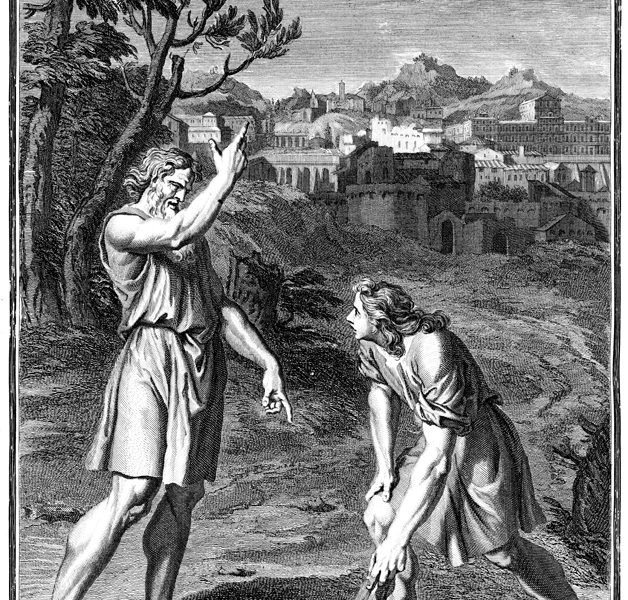
930 BC to 910 BC, Psalm 1: Tearing
This site was first built in French (see www.147thgeneration.net). The English translation was mainly done using « google translation ». We have tried to correct the result of this translation to avoid interpretation errors. However, it is likely that there are unsatisfactory translations, do not hesitate to communicate them to us for correction.
(for that click on this paragraph)
Summary
This generation is from the years 930 BC to 910 BC
According to our count, this generation is the 1st generation associated with Psalm 1. It is in this Psalm 1 that we therefore find an illustration of the facts of this generation.
The first generation is the generation of King Rehoboam, son of Solomon who succeeds him. His reign was seventeen years, approximately the duration of the first generation of the night. This period must be completed by the reign of his son Abiam. The reign of Abiam was three years. The cumulative reigns of Rehoboam and Abiam total twenty years, the equivalent of the first generation.
At Rehoboam’s coronation, Jeroboam, son of Nebat, complains to the new king: « Your father made our yoke hard. Now you lighten your father’s hard work and his heavy yoke which he placed upon us, and we shall serve you. »
Rehoboam reserves his answer and first took counsel with the elders who answer him: « If you will be a servant to this people today, and you will minister to them and you will respond to them and speak kind words to them, then they will be your servants for all times ». He rejects this advice in favor of the advice of « young men ». The young men that had grown up with him spoke to him saying: « So shall you say to this people who have spoken to you saying, ‘Your father has made our yoke heavy, and you make it lighter for us,’ thus shall you speak to them, My little finger is thicker than my father’s loins ».
Rehoboam by his inadequate response to the revolt led by Jeroboam causes the split of the kingdoms. His kingdom now encompasses only two of the twelve tribes of the kingdom of Solomon, the other ten forming the kingdom of King Jeroboam. Following God’s advice, Rehoboam had given up waging war on Jeroboam. Thus were born, from the split, the kingdoms of Judah (Rehoboam) and Israel (Jeroboam).
The night begins.
Talk
Rehoboam
This generation is that of the years between 930 BC and 910 BC, the first following the death of Solomon.

The generation of the years 930 to 910 BC initiates the 3000-year long night into which the Jewish people enter after Solomon’s death. Because of the divine promises, the night could not begin neither during the lifetime of King David nor that of King Solomon as it was explained in the page “Shavuot”.
The first generation (930 BC / 910 BC) is the generation of King Rehoboam, son of Solomon who succeeds him. His reign was seventeen years, approximately the duration of the first generation of the night. This period must be completed by the reign of his son Abiam. The reign of Abiam was three years. The cumulative reigns of Rehoboam and Abiam total twenty years, the equivalent of the first generation.
What was valid during the day (before Solomon’s death) remains valid after: the only durable values in the material world are those associated with the observance of the law of the Lord. It is they who will allow those who respect them, failing to dominate the real world, to enter the future world in the Garden of Eden. Where the trees are eternal, trees whose leaves do not wilt.
This is what the beginning of the Psalm of this generation reminds us:

- The praises of a man are that he did not follow the counsel of the wicked, neither did he stand in the way of sinners nor sit in the company of scorners.
- But his desire is in the law of the Lord, and in His law he meditates day and night.
- He shall be as a tree planted beside rivulets of water, which brings forth its fruit in its season, and its leaves do not wilt; and whatever he does prospers.
Those who will obey the law of the Lord will reach the future world regardless of the efforts of the wicked because God protects the righteous not in the real world but by preserving the entrance of the future world.
The psalmist recalls moreover that this rule which was valid before this generation (day) remains valid for the following generations (night). But this advice is not followed by Rehoboam or his successor Abiam. In fact he had not been followed by Solomon, but he had received a « reprieve ».
Jeroboam
Indeed, this generation confirms the prediction of Ahiyya made to Jeroboam about the dynasty of Solomon, because of the latter’s failings:
- And it came [1] to be at that time when Jeroboam had left Jerusalem, that Ahijah, the Shilonite, the prophet, found him on the way, and he was wearing a new garment, and the two of them were alone in the field.
- And Ahijah grasped the new garment that was upon him and tore it into twelve pieces.
- And he said to Jeroboam, « Take for yourself ten pieces, for so has the Lord, the God of Israel, said, « I shall tear the kingdom out of Solomon’s hands and I shall give you the ten tribes.
- But he will have one tribe, for My servant David’s sake and for Jerusalem’s sake, the city which I have chosen of all the tribes of Israel.
- Since they have deserted Me and have prostrated themselves to Ashtoreth, the goddess of the Zidonians, to Chemosh, the god of Moab, and Milcom, the god of the children of Ammon, and they have not walked in My ways, to do what is right in My eyes to keep My statutes and judgments as did David his father.
- However, I will not take any part of the kingdom away from him but I will make him a king all the days of his life for the sake of David My servant, whom I chose, for he kept My commandments and My statutes.
- However, I will take the kingdom away from his son and will give it to you, the ten tribes.
- And his son I shall give one tribe so that David My servant may have a kingdom before Me in Jerusalem, the city which I chose for Myself to place My name there.
The psalmist recalls that sinners lead to ruin. This is the path taken by Solomon and his successors.
For Rehoboam, David’s advice to him is in vain if one refers to the results of his reign, Rehoboam « stands in the way of sinners« :
- And Rehoboam [3], the son of Solomon ruled in Judah; forty-one years of age was Rehoboam when he became king and seventeen years he reigned in Jerusalem, the city that the Lord had chosen to place His Name there out of all the tribes of Israel, and his mother’s name was Naamah the Amonitess.
- And Judah did what displeased the Lord, and they angered Him more than their forefathers had done with their sins that they sinned.
- And they, too, built for themselves high places, monuments and trees for idol worship on every high hill and under every green tree.
- And also adultery was in the land; they did as all the abominations of the nations that the Lord had driven out from before the Children of Israel.
In addition to standing « in the way of sinners« , Rehoboam « follow the counsel of the wicked« , the council of young people around him who advise him to harden the yoke imposed on the people rather than listen to the wisdom of the » old men who advised the contrary.
Schism
Thus, instead of reversing the tendency begun by Solomon, his father, he hardened even more his position towards the other tribes represented by Jeroboam, who will inherit it after the split of the two kingdoms:
- And [4] Rehoboam went to Shechem, for all Israel had gone to Shechem to make him king.
- And it was when Jeroboam the son of Nebat heard of this when he was yet in Egypt where he had fled from the presence of king Solomon, and Jeroboam had settled in Egypt.
- And they sent and called him, and Jeroboam and all the congregation of Israel came, and spoke to Rehoboam saying,
- « Your father made our yoke hard. Now you lighten your father’s hard work and his heavy yoke which he placed upon us, and we shall serve you. »
- And he said to them « Go away for three days, then return again to me. » And the people departed.
- And king Rehoboam took counsel with the elders who had attended Solomon his father while he was yet alive saying: « What counsel do you give me to reply to this people? »
- And they spoke to him saying, « If you will be a servant to this people today, and you will minister to them and you will respond to them and speak kind words to them, then they will be your servants for all times ».
- But He disregarded the counsel of the elders who advised him, and he took counsel with the young men who had grown up with him and who were attending him.
- And he said to them: « What do you advise that we reply to this people who have spoken to me saying, ‘Lighten the burden which your father has placed upon us’? »
- And the young men that had grown up with him spoke to him saying: « So shall you say to this people who have spoken to you saying, ‘Your father has made our yoke heavy, and you make it lighter for us,’ thus shall you speak to them, My little finger is thicker than my father’s loins ».
- And now, where my father did burden you with a heavy yoke, I shall add to your yoke; my father flogged you with whips, but I will flog you with scorpions. »
- Jeroboam and all the people came to Rehoboam on the third day, as the king had spoken, saying, « Return to me on the third day. »
- The king replied to the people harshly, and he disregarded the counsel of the elders which they had advised him.
- And he spoke to them as the counsel of the young men saying, « My father made your yoke heavy, and I shall add to your yoke; my father flogged you with whips, and I shall flog you with scorpions. »
- The king did not listen to the people, for it was something brought about by the Lord, in order to fulfill His word, that the Lord had spoken through Ahijah the Shilonite to Jeroboam, the son of Nebat.
- And all of Israel saw that the king did not listen to them, and they replied to the king saying: « What share do we have in David? And no heritage in Jesse’s son. To your homes, O Israel! Now see your house, David, » and the Israelites went to their homes.
- [As regards] the children of Israel who dwelt in the cities of Judah, Rehoboam ruled over them.
The psalmist recalls that « the way of the wicked/sinners shall perish« . This is the way taken by Solomon and his successors.
The advice given by David will have been in vain if one refers to the record of the reign of Roboam.
Roboam and his generation followed the counsel of the wicked, they stood in the way of sinners, they sat in the company of scorners. Their desire was not in the law of the Lord.
The night
The night begins.

Roboam, by his unsuitable response to the revolt led by Jeroboam, causes the division of kingdoms, his kingdom will encompass only two of the tribes of Israel, the ten others will be under Jeroboam’s control. Following the advice of God, Rehoboam will renounce the war against Jeroboam. The kingdoms of Judah and Israel are born from the split.
During the reign of Rehoboam, King of the Kingdom of Judah, Jeroboam, King of the Kingdom of Israel, to avoid the pilgrimage of his people to Jerusalem on the lands of Rehoboam, creates an alternative cult. For this he erects two golden calves that he installs at both ends of the country at Beth El and Dan. So that the people will devote an idolatrous worship to them instead of the legitimate worship of God in Jerusalem.
Roboam and Abiam did not respect the way of the « righteous » and put themselves in the voice of the « wicked » it thus sets off the night on the people of Israel and the punishment on their actions. This is summarized in the sequel to the psalm of this generation:

- Not so the wicked, but [they are] like chaff that the wind drives away.
- Therefore, the wicked shall not stand up in judgment, nor shall the sinners in the congregation of the righteous.
However, if the « wicked » are punished and lead the kingdom of David (kingdoms of Israel and Judah) in the way of perish, the righteous will eventually obtain the just reward for their deeds at the end of the night, which is the conclusion of the psalm of this generation:

- For the Lord knows the way of the righteous, but the way of the wicked shall perish

[1] Melachim I – I Kings – Chapter 11, verses 29 to 36
[2] See: Melachim I – I Kings – Chapters 12 and following
[3] Melachim I – I Kings – Chapter 14, verses 21 to 24
[4] Melachim I – I Kings – Chapter 12, verses 1 to 17
